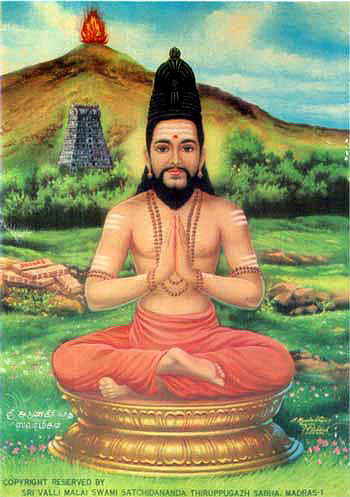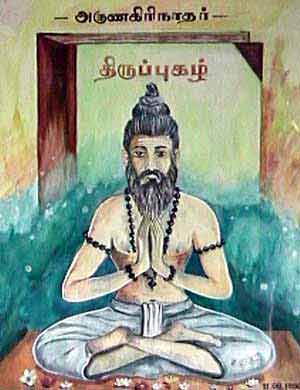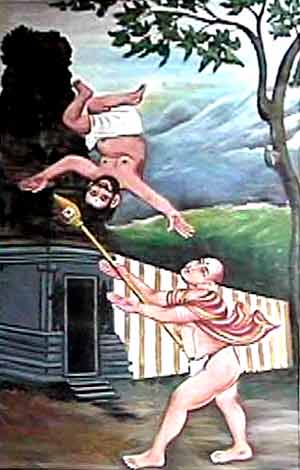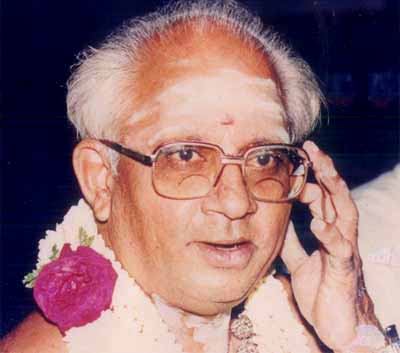
|
|||||||||||
|
| |||||||||||
Saint Arunagirinatharby ‘Guruji' Śrī A.S. Raghavan (article written for Tiruppugazh Kaniyamudam Vizha Malar, September 1998)The holy land of India had given to the world many great saints and sages who have shown to humanity the correct way of leading a peaceful, happy and divine life. Among them Saint Arunagirinathar, who lived in the fifteenth century, had given to us nine most valuable gems of his works:
Arunagiri was born in Tiruvannamalai, which is one of the sacred places in India held in great veneration by the Saivites. The very thought of this place is believed to confer release (mukti). He was a great devotee of Murugan and this devotion to Murugan must have run in his blood, whether or not it was conscious. Such devotion seems to have been continuous, from generation to generation. It is also possible that Arunagiri felt he was a devotee of Murugan in his previous birth also. It is a marvel that Arunagiri is able to express lofty thoughts in felicitous phrases which, so to say, sing and dance in a dazzling variety of ways. As we read his songs, we see the scenes flash before our mind's eye. It may be a description, one-half of which we see the picture of an old man, grey haired and pot bellied, walking unsteadily supported by the staff, and the other, a delightful picture of Rama as a child crawling along as Kausalya stretches forth her hands to receive Him. It may be a picture drawn with a few strokes describing the life of a person from the pre-natal to the post-mortal state or a tale full of sound and fury signifying nothing unless the Lord is pleased to rescue him. We come across various styles of composition, whether it is a slow steady flow, or like a river in spate, whether it is a short song or long one, whether it has a large number of sanskrit words or few such, we are astonished at Arunagiri's complete mastery of the language.
The main thrust of Arunagiri in his works was his repeated appeal to humanity to follow Love, Avirodha (non-hatred), and charity. It is common knowledge that hatred divides people whereas love unites them. The world is torn by hatred of many types based on differences in religion, language, etc. Not only between one major religion and another but also within the same religion, we find rivalry and hatred, but in Arunagiri we find no such hatred. He is single minded in his devotion to Murugan. Yet he achieves a marvel of family harmony by relating Murugan to Siva and Parvathy as his parents, Ganapathy as his elder brother and to Vishnu and Lakshmy as his parents in law. Their description and excellence are set forth in a manner not only acceptable to followers of these Deities and thus enable portions of these songs dealing with Deities being used in their respective worship, but also so designed that the praise of the excellence of Murugan flows aptly. We find his emphasis on ethics when he calls for performance of one's duties especially in the matter of charity with no thought of oneself as the giver. With total devotion to the God, one is to help souls in distress. We may see another dimension of Arunagiri's personality - being free from egoism. His prayer to the Lord to be cleansed of this impurity is answered. He considers himself as a person of no significance at all. We hear of "suicide squads", members of which volunteer for work, which may be fatal. Emancipated souls, likewise, are prepared to forgo the bliss they enjoy in meditation in order to labour and suffer for others. On occasions chosen by the Lord, emancipated souls may enlist themselves as members of a mission seeking redemption, forgoing their enjoyment of bliss. May we not understand in this sense Arunagirinathar's identification with all those who have lapses, spiritual and moral? Arunagiri never forgets that it is due to Murugan's Grace that he could overcome the temptation of the world and defy death also. His insight and experiences recorded in his works do give us his philosophy of life - life in its fullest sense in all its abundance. His work would also help us to have life and have it in abundance. One of the remarkable features of Arunagiri's works is that even those songs which children would retain in their memory as they sing them joyfully contain profound truths. Thus etched early in their tender minds, these truths would guide them all through their lives. They may not be alive to their meaning in the early stage of their lives. But as they grow it would become increasingly clear. The meaning also may be understood by each according to his or her tradition and personal experience. This personal experience again may help ascend from level field to ever higher levels. Arunagiri emphasizes that devotees need not refrain from honest manual work of any kind on the ground that they are busy in singing the praises of the Lord. Let their thoughts and words be in service of Lord and their physical action be for earning bread for others and themselves. As mother bird trains its fledglings to jump and fly lower to higher branches of a tree before they can take off skyward, Arunagiri trains us to go from the relatively simple to the complex in spirituality by linking up charity with control of anger, arresting the ceaseless activity of the mind and remaining in one's natural state.
The sages and saints of all religions are unanimous in their finding that the soul can find everlasting happiness and peace only if self-realisation or communion and union with God. Arunagiri reminds that human birth is rare to obtain. Yet if it is not rightly used in worship of the Lord and service to his creatures, we shall have thrown away a golden opportunity. We must not put off till the very end. This learning must not only be in respect of the sound understanding of the meaning of the verses, but it must also be letter-perfect. In one of the songs of the Tiruppugazh, Arunagiri sings "the Supreme Being cannot be seen with the aid of learning. It cannot be attained by worship. It cannot be spoken about in any adequate manner. It is beyond the reach of those who are not pure in their hearts. It abides without parting with the devotees. It cannot be enveloped by Maya. It is beyond the reach of sound and Akasa. It is the cause of everything". Yet he goes on to pray that he may be taught to know this Supreme Being and be in union with it; getting free of bodily entanglements Arunagiri has experienced the Supreme as Murugan. He is able to pass with remarkable ease from the personal to the Superpersonal and back again. In his compassion for those of us who have to be trained for arduous discipline of contemplation at the higher levels, Arunagiri not only sings about the Supreme Being as Murugan, but he has also given us an entire work of adoring him. We are blessed by the Lord to learn and sing all the nine works of Saint Arunagirinathar. Let us all qualify ourselves to be devotees of Lord Muruga by sincerely learning the meaning of the songs we learn and follow their teachings to attain spiritual knowledge and to have a peaceful, happy and divine life. With the Lord's grace Arunagiri's works are spreading all over India and other parts of the world in East and West. These will definitely create peaceful not only in the learners' mind but also all around the world at large. May the influence of Arunagirinathar which has sustained over six centuries grow from strength to strength in centuries to come.
Saint Arunagirinathar: Was he a Shakta? The Tiruppugazh Way: The Story of Guruji A.S. Raghavan Guruji's new book: 'thalam thoRum tamizhk kadavuL' Thiruppugazh — Musical Way of Worship Articles about other Muruga bhaktars Kaumaram.com's Tiruppugazh resource section |



